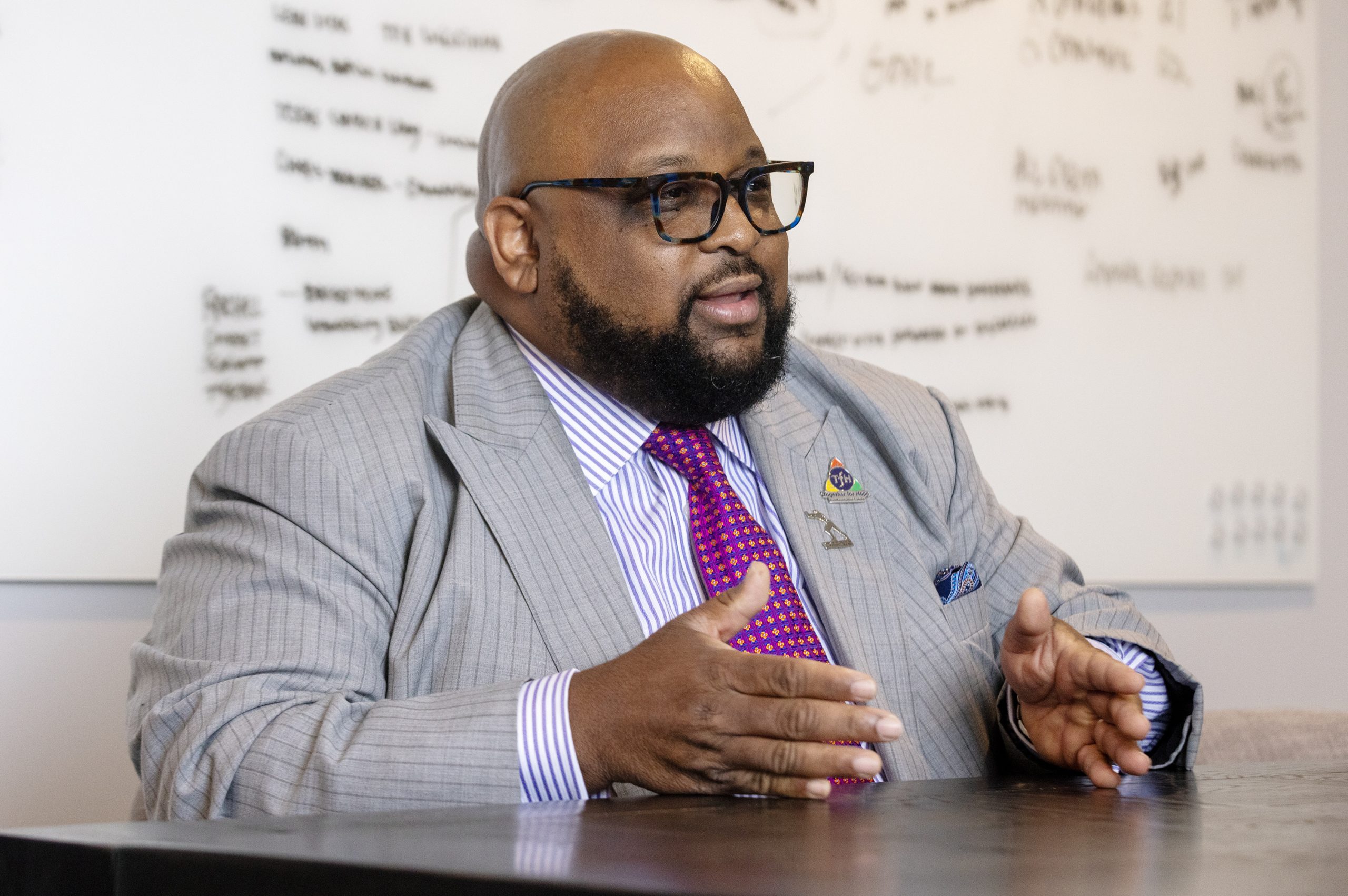Mississippi Today
Q&A: Rev. Charlton Johnson on seeing Medicaid expansion not as a financial issue, but a moral necessity

Rev. Charlton Johnson only joined Together for Hope as leader of its Delta region in September, but he began thinking about Medicaid expansion long before that.
Together for Hope, an organization that works with people in the poorest counties in the country, has ramped up its efforts advocating for Medicaid expansion in Mississippi. The nonprofit hosts summits all over the states to bring together faith leaders, medical experts and health care advocates to raise awareness about Medicaid expansion. The policy, which would provide health insurance for an additional 200,000 to 300,000 Mississippians, would greatly improve health care access for the communities they work with, according to the organization.
But Gov. Tate Reeves remains steadfast in his opposition, despite support from a majority of Mississippians, and has derisively referred to Medicaid expansion as adding more people to “welfare rolls.”
Mississippi is one of only 10 states that has not expanded Medicaid. Over its first few years of implementation, research shows expansion would bring in billions of dollars to Mississippi and help the state's struggling hospitals.
Johnson, who was born in Greenville and who has worked as a chaplain for hospitals in Memphis and Jackson, acknowledges its financial benefits. But expansion is about more than that, according to Johnson — it's really about helping your neighbor.
Johnson spoke with Mississippi Today about the need for Medicaid expansion, and what the Governor's refusal to consider the policy says about morality in Mississippi.
This interview has been edited for clarity and length.
Mississippi Today: Talk to me a little bit about what Together for Hope is and what it does for people who have not heard of it.
Rev. Charlton Johnson: It is a coalition with its focus on fighting rural, persistent poverty. Persistent poverty is defined as an area that has been under the federal threshold for poverty for consistently 30 years, and in Mississippi alone, we have 53 counties that meet that definition of persistent poverty. We are a national group, so I'm serving what we call the Delta region, which comprises the poorest counties in Mississippi, in Arkansas and Missouri; some parishes in Louisiana; Illinois — basically along the Mississippi River.
MT: Can you explain a little more in detail what the organization does, specifically?
Johnson: We serve as a bridge for grassroots organizations and what we call grass-top organizations that are trying to find ways to make an impact on the ground. For instance, there is this group that we partner with out of the Delta called Hands for Hope. They have tried to intervene with the food scarcity in that area because they don't have a lot of grocery stores and fresh foods. Most people do their grocery shopping at Family Dollar or Dollar General. Now, they have a space where they receive fresh foods, like a distribution. Our job is making that connection between the community and that organization. A lot of grassroots organizations have a mission or idea of how they want to help the community, but they don't always have the resources to turn something around.
MT: What kind of work does Together for Hope do around Medicaid expansion?
Johnson: It's largely advocacy, with hosting the summit. Expansion has not been framed the right way. That was even mentioned in our last staff meeting, that we almost need to just pull it back from saying Medicaid expansion versus just starting to meet those who are in the gap. There are so many people who are in that void of not being able to receive health care.
As a chaplain in hospitals, I've seen people use the emergency room as their primary care physicians, or they can't go to the doctor and get sick enough they end up in the ER. That's because people don't have insurance. Seeing that was an awakening moment for me — it was when I began to recognize that people are not just running in here because they're sick. It's because the hospital has become their only option.
MT: I'm sure you were hearing about expansion long before starting this job. How do you think we have been talking about expansion, and how do you think we should be talking about it?
Johnson: Before coming into this role, I heard conversations about the need to expand Medicaid, which came while President Obama was in office. But there was so much resistance from red states to support that kind of initiative. People were trying to do their best to tear it apart. And Mississippi, of course, being the red state that it has long been, did not accept monies to help make this program more robust in Mississippi. So to hear Governor Reeves saying that he still isn't interested in expanding Medicaid, to me it is just continuing the talking point that I heard from people who share his political ideology. When I heard that this organization Together for Hope was out there trying to help people better understand how it helps, not just people but the community as a whole and to also fight poverty, I wanted to be on the front lines.
MT: I'm wondering how you, as a pastor, square red states that are really religious with this resistance to helping some of the most vulnerable people in the state?
Johnson: I have a hard time. As a person of faith, it's so hypocritical to me, because when you look at the 10 commandments, Jesus teaches that all of those commandments can be boiled down to two. The first is loving God, but the second one is loving your neighbor as yourself. And if I love my neighbor, then I recognize that we have a mutual interest in each other doing well.
That's not something that I readily see in a hospitality state like Mississippi. So that's hard for me to square for myself personally, but I also recognize that we're all at different places in our walk of faith. I think if you're Christian, you walk the walk of Christ long enough at some point, it changes your heart, and it begins to alter the way you see those around you, so I have hope that one day they'll see that change.
But until that day, it just means that those of us who do see the need for change, need to not only be vocal, but need to be out front with doing those acts of compassion, of grace and mercy.
MT: If you were to explain what Medicaid expansion is to someone who wasn't familiar with it, or someone who opposes it, what would you say about the policy and its significance?
Johnson: I've been holding on to a passage in Psalms 23 which says that “though I walk through the valley of the shadow of death, I will fear no evil: for thou art with me.” It's not that we don't have something to fear, but Christ is with us. Christ is with the hurting. And to say that we are Christ's followers means that we need to follow Christ to where those who are hurting to help, to offer grace, to offer support.
And I see access to health care as a means of offering grace to people, or expanding Medicaid, bridging the gap — whatever phrase people want to put to it.
MT: Together for Hope advocates for expansion because of their work in communities of poverty, as I understand it, so can you talk a little bit about the connection between poverty and poor health outcomes?
Johnson: If people are not getting the medical care they need, the health disparities are going off the charts. People are dying unnecessarily because they don't even have the option of going to the doctor when they need it. When they get sick, they have to just muster through it and hope that they'll be okay. And I don't think that's what it means to live in a community.
MT: If Mississippi continues to forgo expansion, what are the consequences for the communities you work with?
Johnson: Those health outcomes will continue to get worse and worse is the short answer. But I don't think that robs compassionate people of ingenuity. We're going to find a way to help people.
Expansion seems the most logical way that it can be done, but if we have to find an I'll-climb-the-mountain-side way of helping people with health care access, we will.
This article first appeared on Mississippi Today and is republished here under a Creative Commons license.
Mississippi Today
EPA absolves MDEQ, Health Department of discrimination in funding Jackson water
About a year and half ago, on the heels of Jackson's infamous water system failure, advocates and politicians from Mississippi began publicly questioning the funding mechanisms that are supposed to support such systems.
In October 2022, U.S. Reps. Bennie Thompson and Carolyn Maloney wrote Gov. Tate Reeves, grilling him over an apparent disparity in how federal infrastructure funds were allocated to Jackson versus other parts of the state.
Then days later, the Environmental Protection Agency's civil rights office opened an investigation into two state agencies — the Mississippi Department of Environmental Quality and the Mississippi Department of Health — in response to the NAACP's claims of discrimination under Title VI of the Civil Rights Act of 1964. Title VI prohibits discrimination — based on race, color or national origin — in providing federal assistance.
On Monday, though, the EPA announced it had ended the probe after finding no evidence the agencies had short-changed Jackson's water system. In its investigation, the EPA looked at the funding amounts and racial demographics of cities that received water funding from MDEQ and the Health Department and determined there was no correlation between the two factors.
“The evidence overwhelmingly shows that the Mississippi Department of Environmental Quality did everything right,” MDEQ Executive Director Chris Wells said in a press release following the EPA's announcement.
The two agencies are in charge of disbursing funds from the EPA called “state revolving loan,” or SRF, funds, which are meant to help cities make infrastructure improvements. MDEQ handles SRF funds related to wastewater infrastructure, while the Health Department handles SRF funds for drinking water.
But the claims against the agencies were only part of the 2022 complaint the NAACP filed with the EPA. The federal agency did not address another complaint: The group also focused on the state Legislature, which has denied attempts in recent years by Jackson to raise money for its water system, such as creating a new 1% tax.
Click here for the EPA's full responses to MDEQ and Health Department.
This article first appeared on Mississippi Today and is republished here under a Creative Commons license.
Mississippi Today
MSGOP Chair Bordeaux stepping down. Mike Hurst endorsed as successor
Mississippi Republican Party Chairman Frank Bordeaux announced on Wednesday that he will not seek reelection to his post and endorsed former U.S. Attorney Mike Hurst to succeed him.
Bordeaux, an insurance executive, wrote on Facebook that he's had a great tenure as the party's chairman, but it was time to “pass the torch” to a “new leader with a fresh perspective.”
“We've seen a lot of success,” Bordeaux said. “We've elected more Republicans in the last few years to local, state, and federal offices than at any point in history. With every election, we've gained seats and put more conservatives in positions to improve the lives of Mississippians.”
Republican Gov. Tate Reeves in September 2020 backed Bordeaux, a longtime Coast resident, to replace former GOP Chairman Lucien Smith, a move that likely proved crucial to the governor transforming the Coast into a political firewall of support during the 2023 statewide election.
It's typical for a sitting Republican governor, as head of the state party, to pick a new chairman. While the executive committee technically elects a GOP chairman, a governor's choice is typically installed by acclamation. There has been no major executive committee challenge to a Republican governor's chairman nomination in recent history.
Reeves did not immediately make a statement after Bordeaux' announcement on social media, but Hurst in a statement on Wednesday indicated he has Reeves' support.
“I want to thank Gov. Tate Reeves for his support, Chairman Frank Bordeaux for his incredible leadership, and the staff of the MSGOP, who have all raised our party to new heights and have achieved so much for our conservative principles over the last number of years,” Hurst said.

“Our future is bright in Mississippi and, if elected chairman, I hope I can play a small role in making our state and our party even better in the future,” Hurst added.
READ MORE: Lucien Smith out as MSGOP chair; Gov. Reeves backs Gulf Coast businessman to replace him
Republican Lt. Gov. Delbert Hosemann in a statement Wednesday said: “Being chairman is a tough, uncompensated job which takes a significant amount of personal time. Frank's leadership through part of the pandemic and the recent statewide election has been pivotal to bringing organization, unity, and success to the Republican Party across the state. We appreciate his service and look forward to continuing his efforts under the guidance of Mike Hurst.”
Hurst has been involved in state and national Republican politics for years. He is currently a partner in the Phelps Dunbar law firm's Jackson office. Hurst served as the U.S. attorney for the Southern District of Mississippi under President Donald Trump's administration from 2017 to 2021, and previously served as an assistant U.S. attorney.
Prior to his presidential appointment, Hurst was the founder and director of the Mississippi Justice Institute, a division of the Mississippi Center for Public Policy. He also previously served as a legislative director and counsel to then-U.S. Rep. Chip Pickering, and served as counsel to the Constitution Subcommittee of the U.S. House Judiciary Committee.
Hurst's wife, Celeste Hurst, was elected last year to the state House District 77 seat, representing Madison, Rankin and Scott counties.
This article first appeared on Mississippi Today and is republished here under a Creative Commons license.
Crooked Letter Sports Podcast
Podcast: It’s crunch time in both college and high school baseball.

We are into the second week of May, which means the college and high school baseball seasons have reached the point where every pitch matters. At present, Mississippi State is a likely 2-seed, Southern Miss is a 3-seed and Ole Miss is on the outside looking in. The Rebels, however, can change that this weekend when No. 1 ranked Texas A&M comes to Oxford. Also, Tyler gives the lowdown on all the high school baseball playoff action.
Stream all episodes here.
This article first appeared on Mississippi Today and is republished here under a Creative Commons license.
Did you miss our previous article…
https://www.biloxinewsevents.com/?p=356732
-
SuperTalk FM7 days ago
Driver’s education set to become mandatory in Mississippi as bill passes
-
SuperTalk FM6 days ago
State approves $160M to expand Highway 7 to four lanes in Lafayette County
-
SuperTalk FM2 days ago
Legislation outlawing ‘squatted’ vehicles in Mississippi signed into law
-
Mississippi Today4 days ago
On this day in 1917
-
Mississippi News4 days ago
LCSO wants people aware of a scam circling the area
-
228Sports2 days ago
PRC’s Bats Come Alive Late As Blue Devils Beat Picayune To Advance To 6A South State Title Series
-
Mississippi News4 days ago
Winston Co. Sheriff’s Office investigates shooting at Dave’s Club
-
Mississippi News7 days ago
Altercation at Mississippi police department leads to officer-involved shooting





































